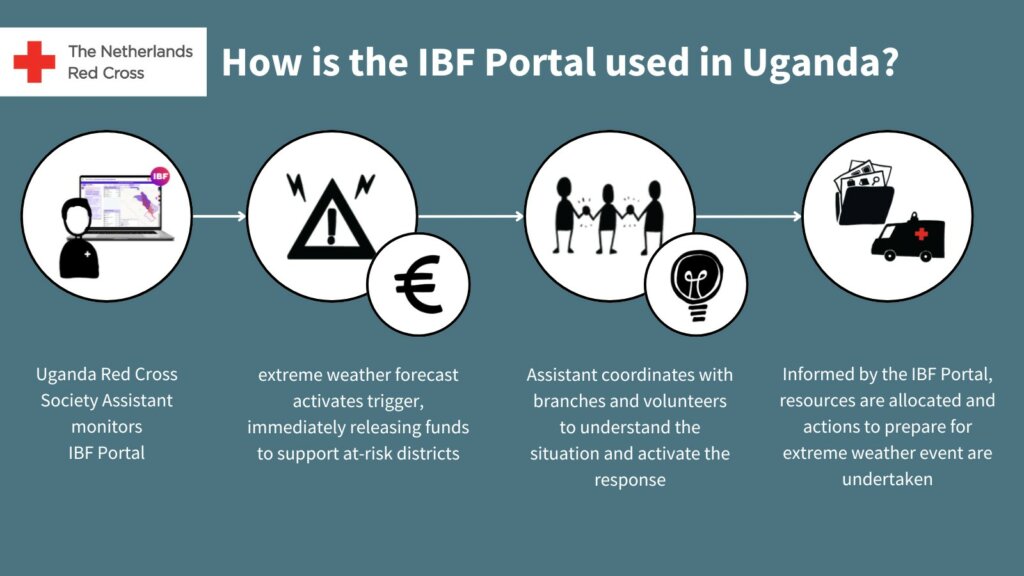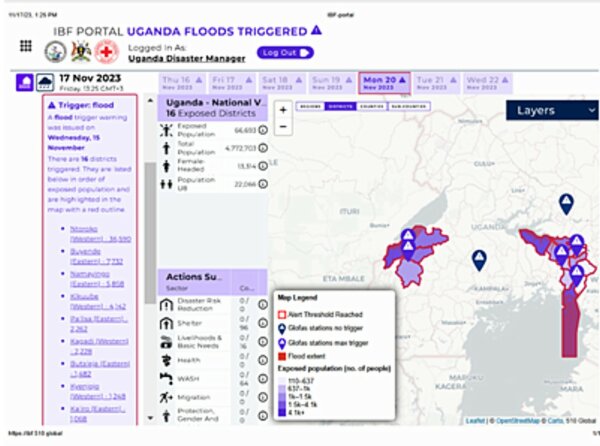Les défis auxquels le secteur humanitaire est confronté aujourd'hui sont multiples, allant des crises sanitaires à l'augmentation des catastrophes d'origine climatique. L'Ouganda n'est pas étranger à ce phénomène, avec une exposition régulière aux inondations, aux sécheresses, aux glissements de terrain et aux épidémies qui mettent à rude épreuve la population locale et les ressources naturelles. Pour relever ces défis, une collaboration efficace est essentielle. Financé par le Partenariat programmatique entre l'Union européenne (UE) et la Fédération internationale des sociétés de la Croix-Rouge et du Croissant-Rouge (FICR), la Croix-Rouge ougandaise et la Croix-Rouge néerlandaise se sont engagées dans une puissante coopération visant à accélérer la préparation et les réponses locales aux crises dans le pays.
Le partenariat au service de la localisation
La Croix-Rouge néerlandaise compte 12 sociétés nationales de la Croix-Rouge et du Croissant-Rouge partenaires bilatéraux. Ces partenariats sont renforcés par les Desks qui assurent la coordination avec les équipes sur le terrain, ainsi que l'alignement et le soutien opportun basé sur les priorités et les besoins locaux. Dans le cadre du partenariat programmatique entre l'UE et la FICR, la Croix-Rouge ougandaise et la Croix-Rouge néerlandaise collaborent pour renforcer les éléments suivants localisation. En cas de catastrophe, les acteurs locaux sont souvent les premiers à intervenir, car ils disposent d'un accès vital à des zones hors de portée de la communauté internationale. Leur présence continue au sein des communautés permet de faire le lien entre les secours immédiats et le renforcement de la résilience à long terme. Au sein du Mouvement de la Croix-Rouge et du Croissant-Rouge, les Sociétés nationales sont le fer de lance de la coordination de l'aide, en liaison avec les autorités nationales et les organisations partenaires. Dans cette optique, des efforts sont déployés pour aligner les systèmes de préparation et de réponse aux catastrophes aux niveaux national, du district et de la communauté en Ouganda. Le partenariat entre les deux Sociétés nationales s'articule autour de trois formes différentes d'action humanitaire : l'action anticipative, l'engagement et la responsabilisation des communautés, et l'assistance en espèces.
"Le partenariat programmatique soulève de nouvelles questions. Que signifie la localisation et à quoi ressemble-t-elle en Ouganda ? Dans l'ensemble, ce programme mis en œuvre dans plusieurs pays est un miroir qui montre ce que nous pouvons améliorer au niveau mondial et met en évidence les possibilités d'harmonisation de la localisation.
Els van Dam, chargée de portefeuille au bureau de la Croix-Rouge néerlandaise en Ouganda
Se préparer aux catastrophes avec le portail de l'IBF
L'une des pierres angulaires de la collaboration entre les deux Sociétés nationales a été l'élaboration et la mise en œuvre de stratégies d'action anticipative, en s'appuyant sur des outils novateurs tels que le système d'information de la Croix-Rouge néerlandaise. Portail des prévisions basées sur l'impact (IBF). Le IBF Portal est une plateforme numérique complète conçue pour aider les gestionnaires de catastrophes à prendre des décisions opportunes qui sauvent des vies. En fournissant des avertissements cruciaux sur l'impact d'une catastrophe imminente, informés par des sources de données en temps réel, les professionnels de l'action anticipée sont habilités à prévoir, atténuer et répondre efficacement à l'évolution des phénomènes météorologiques extrêmes, des inondations aux cyclones en passant par les sécheresses. En outre, le portail permet de localiser les infrastructures à risque, ce qui facilite l'élaboration de solutions sur mesure pour répondre aux défis et aux besoins spécifiques de chaque communauté. Ainsi, le portail IBF sert de plateforme essentielle pour déclencher des mesures de réponse proactives basées sur des prévisions fondées sur des données.


En Ouganda, le portail de l'IBF est utilisé pour fournir des alertes avant les grandes inondations. En novembre 2023, le portail a déclenché l'activation d'un protocole d'action précoce (EAP) pour la première fois en prévision des fortes pluies et des inondations qui s'ensuivront, lançant des activités d'intervention dans le domaine de l'hébergement, WASH et la réduction des risques de catastrophe. Reconnaissant l'immense potentiel du portail IBF pour sauver des vies et réduire les coûts des interventions d'urgence, la Croix-Rouge ougandaise envisage d'étendre son utilisation et de le mettre en œuvre pour une surveillance plus générale des inondations à travers des seuils multiples, ainsi que de le compléter avec un mécanisme de surveillance des sécheresses imminentes. Pour mettre en œuvre la vision de la Société nationale, des ateliers et des discussions avec le gouvernement local, les partenaires techniques et la Croix-Rouge néerlandaise ont mis en évidence les possibilités d'améliorer la fonctionnalité du portail, notamment en améliorant la disponibilité et la précision des données et en définissant des seuils pour la déclaration des catastrophes. Cette mise en commun de l'expertise locale et de l'apport technique a permis de poursuivre le développement du portail IBF, sur la base des priorités et des besoins des acteurs locaux.
"Le portail IBF m'a aidé, en tant qu'utilisateur, à identifier les zones à haut risque sujettes aux inondations et les populations susceptibles d'être affectées, ainsi qu'à activer les équipes de la Croix-Rouge pour qu'elles mènent des activités de préparation. Dans tout l'Ouganda, les communautés touchées ont pu dégager les canaux de drainage et évacuer avant que les inondations dangereuses ne frappent, réduisant ainsi l'impact sur les maisons et évitant des pertes de vies humaines."
Joel Kitutu, chef de projet pour le partenariat programmatique à la Société de la Croix-Rouge de l'Ouganda
Rendre l'action humanitaire plus axée sur les communautés et les données
La Société de la Croix-Rouge ougandaise vise en outre à mettre en œuvre une approche structurée pour se connecter et répondre efficacement aux communautés, afin de recueillir et d'agir efficacement sur le retour d'information, et d'accélérer leur réponse aux personnes dans le besoin. En février 2024, l'équipe de la Croix-Rouge néerlandaise s'est rendue au siège de la Société de la Croix-Rouge de l'Ouganda à Kampala pour organiser un atelier sur l'engagement et la responsabilité des communautés numériques, qui a révélé la nécessité de mettre en place un mécanisme de retour d'information pour que l'action humanitaire soit davantage axée sur les communautés. Reconnaissant le potentiel des solutions numériques en termes de collecte, de stockage et de visualisation des données, ainsi que de suivi des commentaires reçus, la Société nationale vise à adopter des outils numériques intégrés pour s'assurer que les voix de la communauté ne sont pas seulement entendues, mais qu'elles sont également au cœur des processus de prise de décision.
Enfin, la Croix-Rouge ougandaise s'associe à la Croix-Rouge néerlandaise pour renforcer l'efficacité, la sécurité et la rapidité de l'aide en espèces par le biais d'un système numérique. L'équipe de la Croix-Rouge néerlandaise a apporté un soutien technique au développement d'un système de gestion de l'information sur l'argent liquide, réalisé par l'agence informatique ougandaise NITA-U. Alors que le déploiement de ce système, développé et hébergé par les parties prenantes locales, progresse, la Croix-Rouge néerlandaise fournit une assistance technique continue, avec des plans concrets pour que la Société de la Croix-Rouge ougandaise devienne l'unique propriétaire du système et en assure la maintenance de manière autonome.
Perspectives d'avenir
La collaboration entre la Croix-Rouge ougandaise et la Croix-Rouge néerlandaise symbolise le pouvoir du partenariat dans la conduite d'une action humanitaire localisée et centrée sur la communauté. En tirant parti d'outils et de stratégies innovants, tels que les plateformes d'engagement numérique, les systèmes rationalisés d'assistance en espèces et les prévisions basées sur l'impact, les deux sociétés nationales sont à l'avant-garde de la préparation et de l'intervention proactives en cas de catastrophe. Alors qu'elles font face aux défis multiformes posés par les catastrophes d'origine climatique et les crises sanitaires, leur dévouement à une collaboration efficace non seulement accélère les réponses locales, mais garantit également que les voix et les besoins des communautés restent au centre de l'attention. À l'avenir, les efforts continus visant à améliorer la fonctionnalité et la portée de ces initiatives, guidés par l'apprentissage mutuel et l'échange d'expertise, renforceront encore l'action locale pour améliorer la situation des populations touchées en Ouganda.
Nous voulons vous entendre !
Souhaitez-vous intégrer l'un des produits ou services mentionnés dans cette étude de cas dans le travail de votre Société nationale ou de votre organisation ? Veuillez contacter :
Chef de produit, portail IBF : Blaise Selvan bselvan@redcross.nl
Coordinateur de services, Action anticipée : Aklilu Teklesadik ateklesadik@redcross.nl
Conseiller, engagement communautaire et responsabilité : Jonath Lijftogt jlijftogt@redcross.nl
Coordinateur de services, assistance en espèces et en bons d'achat : Angelina Savchuk asavchuk@redcross.nl